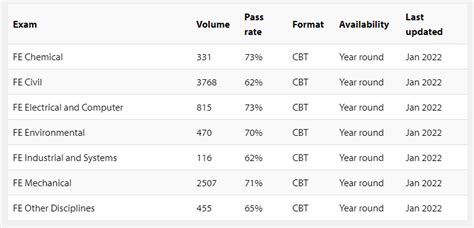Introduction
The Fundamentals of Engineering (FE) exam is a crucial milestone for aspiring engineers. It assesses candidates’ foundational knowledge and problem-solving abilities in engineering principles. Understanding the FE test pass rate is essential for preparing effectively and maximizing your chances of success. This article provides an in-depth analysis of the FE test pass rate, offering valuable insights and strategies to help you achieve your goals.

FE Test Pass Rate Overview
The FE test pass rate varies depending on the discipline and administration period. According to the National Council of Examiners for Engineering and Surveying (NCEES), the overall pass rate for the FE exam in 2023 was 68.1%. However, the pass rates for different disciplines ranged from 56.3% to 79.7%.
Factors Affecting FE Test Pass Rate
Several factors can influence the FE test pass rate, including:
- Discipline: The pass rate varies significantly across engineering disciplines. For instance, in 2023, the pass rate for Civil Engineering was 56.3%, while it was 79.7% for Environmental Engineering.
- Study Time: The amount of time spent studying directly impacts the pass rate. Candidates who dedicate more time to preparation tend to perform better.
- Study Materials: Using high-quality study materials, including practice exams and textbooks, can significantly increase your chances of success.
- Exam Administration Period: The pass rate can fluctuate depending on the time of year the exam is taken. In general, pass rates tend to be lower during peak testing periods.
- Prior Education and Experience: Candidates with a strong academic foundation and real-world engineering experience often have higher pass rates.
Tips and Tricks for Passing the FE Test
To increase your chances of passing the FE test, consider these tips:
- Start Early: Begin studying several months before the exam to allow ample time for comprehensive preparation.
- Create a Study Schedule: Plan a consistent study schedule that accommodates your learning style and availability.
- Use Practice Exams: Take practice exams to identify areas of weakness and improve your time management skills.
- Join a Study Group: Collaboration with fellow candidates can provide support and enhance your understanding.
- Seek Professional Help: Consider working with a tutor or taking a prep course if you encounter difficulties in certain areas.
- Maintain a Positive Mindset: Approach the exam with confidence and focus on your preparation rather than potential setbacks.
Pros and Cons of Taking the FE Test
Pros:
- Career Advancement: Passing the FE test demonstrates your foundational engineering knowledge and opens doors to career opportunities.
- Professional Development: The preparation process enhances your technical skills and reinforces engineering principles.
- Enhanced Confidence: Successfully passing the FE test boosts your self-esteem and motivates further professional growth.
Cons:
- Cost: The FE exam can be expensive, including exam fees and study materials.
- Time Commitment: Preparing for and taking the FE test requires a significant investment of time and effort.
- Stress: The pressure of the exam can be overwhelming for some candidates.
FAQs about the FE Test Pass Rate
- What is the average FE test pass rate? The overall pass rate for the FE exam in 2023 was 68.1%.
- Which discipline has the highest FE test pass rate? Environmental Engineering had the highest pass rate in 2023, at 79.7%.
- How long should I study for the FE test? The recommended study time varies based on your background and preparedness, but a minimum of 100-150 hours of preparation is generally suggested.
- Are practice exams a good way to prepare for the FE test? Yes, practice exams provide valuable experience, identify areas of weakness, and help you manage your time effectively.
- Can I take the FE test multiple times? Yes, you are allowed to take the FE test an unlimited number of times, but there is a waiting period between attempts.
- How often is the FE test offered? The FE test is offered several times throughout the year, typically at testing centers in March, June, September, and December.
Conclusion
Passing the FE test is a challenging but achievable goal that can significantly impact your engineering career. By understanding the FE test pass rate, factors that affect it, and effective preparation strategies, you can increase your chances of success. Remember to start early, study diligently, and approach the exam with confidence. Embracing a positive mindset, utilizing practice exams, and considering professional help when necessary will empower you to conquer this milestone and embark on a rewarding engineering journey.
